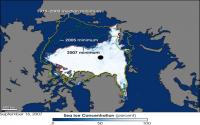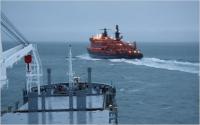Arctic Warming

Quicktabs: Keywords

The world just experienced its hottest June on record. The heat was driven in large by part by the hottest ocean temperatures since recordkeeping began more than 130 years ago. That makes this the third-warmest start to the year.
[ More ]
The shrinking of the Arctic ice sheet in the upcoming 10th edition of the National Geographic Atlas of the World is one of the most striking changes in the publication's history, geographers say.
[ More ]
The length of the melt season for Arctic sea ice is growing by several days each decade, and an earlier start to the melt season is allowing the Arctic Ocean to absorb enough additional solar radiation in some places to melt as much as four feet of the Arctic ice cap's thickness, according to a new study by National Snow and Ice Data Center (NSIDC) and NASA researchers.
[ More ]
A stormier Arctic could fast-track the greenhouse gas into the atmosphere, potentially accelerating global warming.
[ More ]
A new study finds little evidence to support the idea that the plummeting Arctic sea ice has meaningfully changed our weather patterns. The research, published today in Geophysical Research Letters, says links between declining Arctic sea ice and extreme weather are “an artifact of the methodology” and not real.
[ More ]
Since shrinking at a torrid pace in the first half of July, the Arctic sea ice meltdown has slowed markedly.
[ More ]
Arctic ice is losing its reflective sheen. It's common knowledge that each summer, more and more of the ice melts leaving the dark waters of the ocean uncovered – a process that accelerates global warming by reducing the amount of solar radiation reflected back into space. Now it turns out that the surviving sea ice is also becoming darker and less reflective.
[ More ]
Rapid thawing of the Arctic could trigger a catastrophic "economic timebomb" which would cost trillions of dollars and undermine the global financial system, say a group of economists and polar scientists.
[ More ]
Arctic shipping is set for a record year, as melting sea ice raises the prospect of an important new route for trade between Asia and Europe that shaves thousands of kilometres off the trip.
[ More ]
NOAA and NASA both ranked June 2013 among the top five warmest (NOAA fifth warmest, NASA second warmest) Junes on record globally (dating back to the late 1800s). But, more remarkable, was the incredible snow melt that preceded the toasty month and the sudden loss of Arctic sea ice that followed.
[ More ]